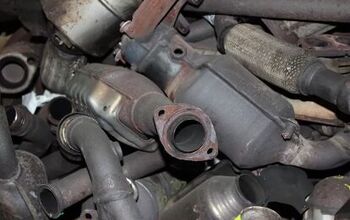Shareholders No Longer Riding Shotgun, Say American Automakers

This week, General Motors CEO Mary Barra and Ford CEO Jim Hackett were among 181 corporate executives claiming their companies need to do more than just deliver value to shareholders. If you just blacked out, we’ll reiterate — chief executives around the country are suggesting businesses need to do more than pad their share price.
We’re wondering why the sudden change of heart.
On Monday, the Business Roundtable — an association of the United States’ largest companies — announced the release of a new “ Statement on the Purpose of a Corporation” to lead their companies for the benefit of all stakeholders. That incorporates customers, employees, suppliers, communities and shareholders.
“While each of our individual companies serves its own corporate purpose, we share a fundamental commitment to all of our stakeholders,” the group said in the statement. “Americans deserve an economy that allows each person to succeed through hard work and creativity and to lead a life of meaning and dignity We believe the free-market system is the best means of generating good jobs, a strong and sustainable economy, innovation, a healthy environment and economic opportunity for all.”
There are a multitude of angles from which to view this. Occupy Wall Street may have failed in its primary goal, but the public purview has grown increasingly suspicious of giant corporations with lots of money and global interests. That only worsened as CEO compensation continued to climb. In fact, a study last week stipulated that CEOs have watched their pay grow by 1,000 percent over the last 40 years. They now make 278 times more than the average worker.
As society becomes increasingly fractured, customers are also looking at businesses that share their values. This has resulted in an influx of business-related propaganda. That’s one reason why you see so many automakers promoting green initiatives without bending over backwards to make tangible changes that would make a real difference. Unfortunately, one of those differences could end up ruining the company.
Businesses need to make money and, regardless of what the Business Roundtable says, they are still beholden to shareholders and the market. But they also cannot have the general public showing up at their offices with torches and pitchforks. The proposed Statement on the Purpose of a Corporation could be a way to assuage anger via a fluffy populist message, and there is plenty on offer here. The general message doesn’t possess much in the way of specifics, though it does assure its readers that employees, shareholders, customers, communities, and the environment will all be supported and respected.
That sounds lovely. However, without clear-cut goals regarding various industries, we’re not sure what good it actually does. Instead of making vague pledges collectively, these corporations could have simply instituted sweeping changes individually. We’re just throwing it out there, but this could all stem from businesses fearing new regulations or a revamping of American capitalism as the political landscape shifts.
Of course, there are other ways to frame this. Some executives and market analysts have grown critical that endlessly trying to appease shareholders and make every quarterly report look better than the last is negatively impacting businesses in the long term. Encouraged by a populace that’s now annoyed with growing income disparity, corporations may see a need to make honest changes to mitigate future disasters.
“This is tremendous news because it is more critical than ever that businesses in the 21st century are focused on generating long-term value for all stakeholders and addressing the challenges we face, which will result in shared prosperity and sustainability for both business and society,” said Darren Walker, President of the Ford Foundation, in a prepared statement.
While the release dealt primarily with American issues, Ford spokesman T.R. Reid painted a more global picture when speaking with The Detroit News. “The principles described in the statement by the Business Roundtable are consistent with how Ford thinks about and conducts our business,” he explained. “Human progress depends on freedom of movement. We are committed to delivering that freedom to people around the globe, earning and keeping their trust along the way.”
The global aspect makes this more difficult. Most of the companies that signed the Statement on the Purpose of a Corporation operate worldwide, meaning their interests may not always be congruous with America’s.
We suppose the big news is that the Business Roundtable embraced shareholder primacy in the 1990s and now appears to be abandoning it — backed by the United States’ largest automakers. Even Fiat Chrysler, which isn’t officially big enough to be a Roundtable member, said it supported the release’s message. But unpacking what that message actually means is needlessly difficult.
Here are the core tenets corporate signatories have committed to:
Delivering value to our customers. We will further the tradition of American companies leading the way in meeting or exceeding customer expectations.
Investing in our employees. This starts with compensating them fairly and providing important benefits. It also includes supporting them through training and education that help develop new skills for a rapidly changing world. We foster diversity and inclusion, dignity and respect.
Dealing fairly and ethically with our suppliers. We are dedicated to serving as good partners to the other companies, large and small, that help us meet our missions.
Supporting the communities in which we work. We respect the people in our communities and protect the environment by embracing sustainable practices across our businesses.
Generating long-term value for shareholders, who provide the capital that allows companies to invest, grow and innovate. We are committed to transparency and effective engagement with shareholders.
It would have been impossible to craft a release that accurately provided specific details applicable to all 181 businesses, but the above doesn’t even effectively establish the groundwork. What does “respect” look like? Does it extend to markets outside of the United States? What constitutes fair compensation of employees and when does that take place? There’s so much being said without any real promises being made and it’s doubtful anyone expects Ford or General Motors to issue a follow-up release outlining those aspects in great detail.
[Image: Sergey Akhrameev/Shutterstock]

A staunch consumer advocate tracking industry trends and regulation. Before joining TTAC, Matt spent a decade working for marketing and research firms based in NYC. Clients included several of the world’s largest automakers, global tire brands, and aftermarket part suppliers. Dissatisfied with the corporate world and resentful of having to wear suits everyday, he pivoted to writing about cars. Since then, that man has become an ardent supporter of the right-to-repair movement, been interviewed on the auto industry by national radio broadcasts, driven more rental cars than anyone ever should, participated in amateur rallying events, and received the requisite minimum training as sanctioned by the SCCA. Handy with a wrench, Matt grew up surrounded by Detroit auto workers and managed to get a pizza delivery job before he was legally eligible. He later found himself driving box trucks through Manhattan, guaranteeing future sympathy for actual truckers. He continues to conduct research pertaining to the automotive sector as an independent contractor and has since moved back to his native Michigan, closer to where the cars are born. A contrarian, Matt claims to prefer understeer — stating that front and all-wheel drive vehicles cater best to his driving style.
More by Matt Posky
Latest Car Reviews
Read moreLatest Product Reviews
Read moreRecent Comments
- MaintenanceCosts If only it had a hatch. The Model S is so much more practical, has similar performance in non-Plaid form, and is $20k more - and the $20k premium seems almost worth it just for the hatch.
- Lorenzo I'm not surprised. They needed to drop the "four-door coupe", or as I call it, the Dove soap bar shape, and put a formal flat roof over the rear seats, to call it a sedan. The Legacy hasn't had decent back seat headroom since the 1990s, except for the wagons. Nobody wants to drive with granny in the front passenger seat!
- Analoggrotto GM is probably reinventing it as their next electric.
- Vatchy What is the difference between a car dealer and a drug dealer? Not much - you can end up dead using what they sell you. The real difference is that one is legal and one is not.
- Theflyersfan Pros: Stick shift, turbo wagonExtra tires and wheelsBody is in decent shape (although picture shows a little rust)Interior is in decent shapeService records so can see if big $$$ is coming upCan handle brutal "roads" in Uganda, Rwanda, and Tanzania, although the spare wheels and tires will be needed. (See picture)Cons:Mileage is high Other Volvos on the site are going for less moneyAnyone's guess what an Ontario-driven in the winter vehicle looks like on the lift.Why wasn't the interior cleaned?Clear the stability control message please...Of course it needs to cross the border if it comes down here. She lowers the price a bit and this could be a diamond in the rough. It isn't brown and doesn't have a diesel, but this checks most TTAC wagon buyer boxes!


































Comments
Join the conversation
highdesertcat you are correct the Koch Brothers more to the Right and Soros to the extreme Left.
Okay, it's been about a year since this statement by the Business Roundtable was released. Has anyone heard of any action taken about it? Is anyone surprised that not much has happened?